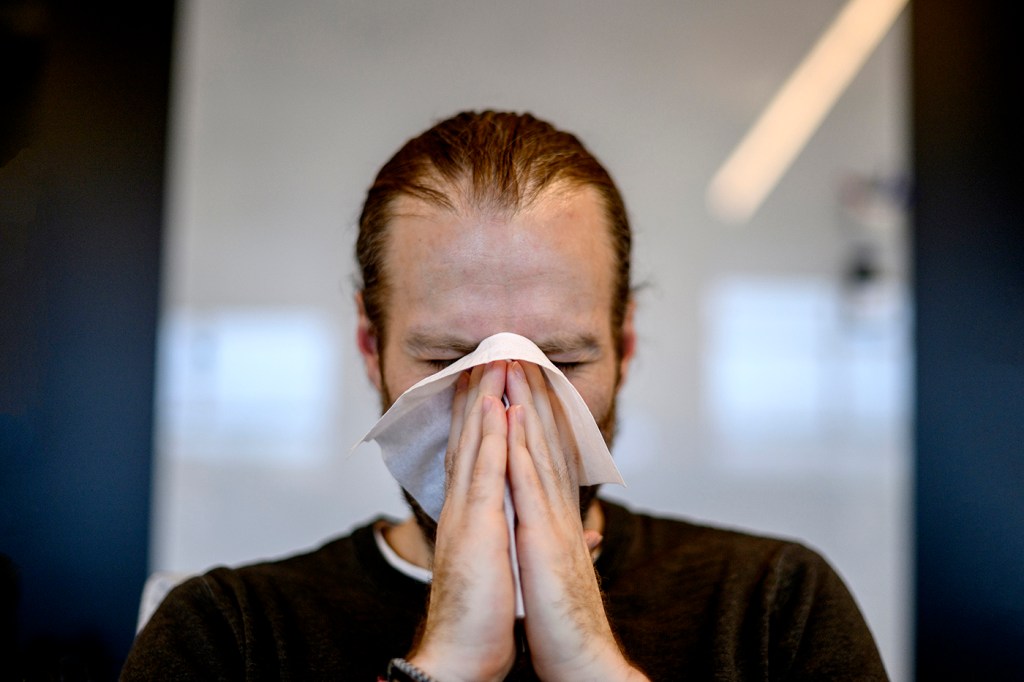Climate change is making seasonal allergies worse—can your nose handle it?

A March report says climate change is extending the pollen and mold allergy season and making it more intense.
Is your nose ready?
The body’s first line of defense against allergens is the nose, says Mansoor Amiji, Northeastern distinguished professor of pharmaceutical sciences and chemical engineering.
But the sheer amount of pollen grains now powdering the air from spring until fall can make it easier for invading allergens to slip past nasal filtration systems and enter the respiratory tract, Amiji says.
“We are always inhaling air—six to seven liters per minute or 11,000 liters a day,” Amiji says.
“All of that air is bringing in all of this stuff—bacteria, viruses, pollen allergens. Most of the time our mouth is closed but our nose is always open. So the nose has to be the main filter to remove it,” he says.
Amiji, who co-wrote a study on why people are more vulnerable to catching colds during the winter months, says a higher density of allergens can overwhelm the nose’s defenses.
The result is symptoms such as sneezing, congestion, itchy eyes, nose and throat, watery eyes, fatigue and coughing.
“The nose is fabulous,” says Dr. Bruce Gordon, an allergist from Massachusetts.
But that doesn’t mean it can stand up by itself to the extra pollen and mold counts produced by climate change, he says.

The nose is designed so that the flow of air into it causes dust and particles to be absorbed by mucus and stay out of the lungs, Gordon says. The mucus usually drains, almost imperceptibly, down the back of the throat and is destroyed by stomach acid or excreted.
An overload of pollen can lead to the allergen being dissolved in the mucus before it has a chance to be killed in the stomach, leading to allergic symptoms.
“If you’re exposed to larger amounts of allergens, more stuff leaks out,” Gordon says.
“It could overwhelm the defense systems,” Amiji says.
The research paper Amiji wrote with Dr. Benjamin S. Bleier at Mass Eye and Ear that uncovered the biological mechanism by which respiratory viruses are more common in winter could hold some clues to combating allergens.
The scientists discovered that viruses have a field day when temperatures drop because that’s when the quantity of virus-fighting fluid sacs—called extracellular vesicles—released in the front of the nose decreases.
Climate change also seems to be undermining the nose’s protective mechanism by producing larger and more concentrated doses of pollen than the organ is designed to stop from entering the respiratory system, Amiji says.
“If we are able to understand how allergens interact with us, and what type of reaction the nose is creating, we can create various types of anti-allergy therapeutic strategies based on that,” Amiji says.
In the meantime, one low-tech solution is to wear a facial covering when high pollen counts are predicted.
“I think wearing a mask is a great idea,” especially when high quality masks like the N95 are coupled with allergy medication, Amiji says.
Gordon also says a high efficiency particulate filter mask could be the best way to keep pollen and mold spores from being breathed in.
Masks can be especially effective in reducing allergy symptoms while doing yard work or spending time outdoors, says Jenny Van Amburgh, clinical professor at Northeastern’s School of Pharmacy.
“They won’t reduce itchy eyes,” she adds, advising people to wash or shower after returning indoors and to keep their windows closed.
Antihistamine and nasal sprays such as Flonase are typically among the first lines of defense before people progress to immunotherapy.
Gordon, who recently retired from practice, says “it’s got to the point now where people need to be on both meds and allergy shots.”
The allergy season report by Climate Central, a nonprofit organization of scientists, researchers and writers, says ”the connections between climate change and seasonal allergies are becoming increasingly clear.”
“From warming temperatures and more freeze-free days to increased carbon dioxide in the atmosphere, climate change is making allergy season longer and more intense, with higher amounts of allergens in the air,” the report says.
“Warming temperatures mean that allergy season arrives sooner in the spring and lasts longer into fall.”
“It extends the blooming time” and melding spring tree pollen, early summer grass pollen and fall weed pollen seasons into one long allergy season, Gordon says.
In addition, the increased carbon dioxide in the atmosphere “is acting as a fertilizer,” he says.
“Plants eat carbon to make more of themselves. The plants grow larger and produce more pollen grains, and the pollen grains are packed with allergens,” Gordon says.
“It’s really complicated,” he says. “It’s not going to be fun.”
Amiji, who says he also suffers seasonal allergies, knows all about the misery.
“Last fall, just walking around our backyard, I saw this huge plume of pollen that literally looked like a cloud that was stagnant in our background,” Amiji says. The encounter produced congestion and watery eyes.
“You’ll hear people say I never used to have allergies and now I’m having them,” Van Amburgh says. She advises people who know they have seasonal allergies to start using medications such as Flonase weeks before their allergen blooms.
Besides over-the-counter and prescribed medications, some people have resorted to using nasal irrigation systems, taking probiotics and getting acupuncture to control their allergy symptoms.
Gordon says a British parasitologist even had some success fighting hay fever with hookworms.
The ultimate remedy, he says, is to get climate change under control.
“Seasonal allergic reactions are like the canary in the coal mine when you think about climate change,” Amiji says. “People start to see the effect immediately.”
Cynthia McCormick Hibbert is a Northeastern Global News reporter. Email her at c.hibbert@northeastern.edu or contact her on Twitter @HibbertCynthia






